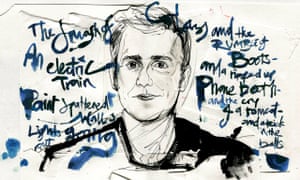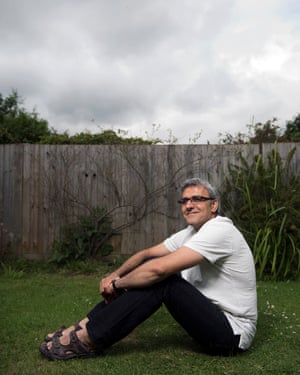 |
| Daljit Nagra won the Forward prize for best first collection in 2007. Photograph: Christian Sinibaldi for the Guardian |
A LIFE IN WRITING
Interview
Daljit Nagra: ‘Poetry is an espresso shot of thought’
Claire Armitstead
Fri 14 Jul 2017
Daljit Nagra remembers the moment his life changed course: it was when he rang home for his A-level results. He was a 21-year-old secondary school dropout from Sheffield who had spent a year at evening classes studying English, sociology and politics. “I didn’t expect to get good grades and when my brother read them out over the phone it was a complete shock.”
He hadn’t presumed to apply for university, but his results were good enough to earn him a place in the clearing system. He took a train down to London for an interview at London University’s Royal Holloway College and was accepted to read English. It was the start of a journey that would lead two decades later to the winners’ podium at the Forward prizes, where he joined the great and the good of the UK poetry world to collect the award for best first collection.
“I defy anyone not to come away from this volume feeling gladdened, afflicted, revitalised,” wrote a Guardian reviewer of his winning book, Look We Have Coming to Dover! Written in a freewheeling “Punglish” – a hybrid of English and Punjabi rhythms – it combined Dulux, Sugar Puffs and Hilda Ogden with chapatis, saris and sitars, exploring the experiences of second-generation British Indians “with captivating exuberance and genuine, striking originality”.
Ten years later, with three well-received collections and a recreation of the Indian epic, the Ramayana to his name, Nagra has become a pillar of the poetry establishment. He is poet in residence at BBC Radio 4 and has a university job around the corner from the one-time “sink school” in which he spent his early teens.
His home in the north London suburb of Harrow is a picture of middle-class family life, with fridge magnet poetry in the kitchen and a trampoline in the garden. Eyeing a large circle of browning grass, he ruefully remarks that he and his wife had just dismantled the playhouse, because their daughters – now seven and nine – had grown out of it.
His new collection, British Museum, combines the canonical jostlings of a mature poet who is negotiating his place on a world stage with intimate musings on the complexities of his own mixed-up culture. “Am I adrift in my heritage?” he wonders in one poem. “I am Sikh by birth, secular by nature,” he declares in another.
There is little trace of the Punglish that marked out his debut collection, though in one poem, he picks a comedy fight in rap rhythms with the “Whitey canon … your lowing herd centuries of verse / that famed an isle & spoke for an echelon / grafted by so many gorgeous clerics / diplomats, lords, academics; etonians and door-knocking Tory petitioners / sponsored by monarchs & earls & slave owners”.
But for all its self-assertiveness, the collection is suffused with survivor guilt, an awareness of what Robert Frost described as “the road not taken”, which taps directly and painfully into his own life story and that of his wider family.
His parents arrived in the UK in the late 1950s, drawn by the promise of jobs. “The British advertised in Punjab because Sikhs were seen as hard workers from farming backgrounds,” he says. It wasn’t a story of escape from hardship – his father was a well-known wrestling champion with a cushy future lined up as a celebrity army officer – but his mother was “completely uneducated”. In their new home in Yiewsley, near Heathrow airport, his father took factory jobs while his mother worked in a hospital laundry. Both did as much overtime as they could, so Nagra, born in 1966, and his older brother spent their free time out with their friends playing football. Every Sunday morning they would spend hours at the local gurdwara (Sikh temple), listening to services recited in 17th-century language. “I didn’t understand a word of it. But part of the idea of my relatives is that the word of God is washing over you.”
The secondary school they went to did not offer O-levels, only the CSE exams aimed at those destined for manual jobs. His brother abandoned school at 16 – “Everyone was told to go and get a job at Heathrow. It’s very hard to go on when you’re at that kind of school. You have to force yourself and the education system to accept you,” Nagra says. But he was saved by a “fascination for learning, for knowledge”. He became an avid watcher of television news and documentaries, and when he demonstrated that he was capable of getting top CSE grades, his family decided that he should become a doctor.
That moment in his school career coincided with his parents’ decision to move north to Sheffield and buy a general store. “The great achievement of that first generation was to get their independence,” he says. “Some of my relatives were starting to buy shops and word got around that this was a good way to make a living. They just learned the trade off other relatives.”
While his brother ran the shop, Daljit struggled with science A-levels, dropping out after a year “because I realised it wasn’t me”. After a couple of years helping out in the shop, he chanced upon a copy of William Blake’s Songs of Innocence and Experience. It was the first book of poetry he had ever read and, he says, it impressed him so strongly that he decided to sign on at a local further education college for A-level evening classes.

Illustration by Alan Vest
It was once he had made it to university that his horizons radically changed. “It was a completely different world. Just being at university. There was a group of 70 of us and everyone seemed to speak a different language, and they talked about Oxford and Cambridge with great reverence and some were dropouts who were quite bitter. It was a magical experience. I made lots of friends, some of whom I still have.”
The most priceless thing he learned, he says, was the art of listening. “I don’t think I’d ever had that experience before: that’s one way to define the move into a different class. People listen and talk calmly.” Thirty years on, his eyes sparkle as he sits back and back in his chair and says: “... someone really listening”.
He took three poems to one of his professors, who was complimentary, but didn’t dare to do anything more with them until, in his late 20s, he spotted an article in the London listings magazine Time Out “offering one-to-one sessions with a contemporary poet called Ruth Padel … She said I needed to read poetry magazines and go to workshops. She gave me the roadmap,” he says.
In the meantime, he had taught English as a foreign language in Greece and the Czech Republic and qualified as a secondary school English teacher. At first he submitted poems to small magazines under a “highly improbable” pseudonym, Khan Singh Kumar. “I thought I’d just write for pleasure, for fun,” he says. But gradually he realised that he needed to take himself more seriously, and began writing under his own name. Years of teaching at the Jewish Free School, a liberal Jewish comprehensive, ended after his Forward poetry prize win.
In 2015, he was appointed Radio 4’s first poet in residence, giving him the licence to roam the country, taking its poetic pulse on behalf of listeners. But there is a darker story that haunts the new collection: his brief, conformist marriage to the mother of his 23-year-old eldest daughter. “I feel stuck on my ex,” he writes. In an opening poem about one of his younger daughters, he says: “Look at me flying upstairs / on the wings of my shame / for my second-chance life”.
His second wife, Katherine, was a teaching colleague who has since retrained as an educational psychologist. One of the most touching poems in the collection mourns his mother’s reluctance to accept her. “Our tongues are reined in: I keep my own counsel / and let the air go bitter when she won’t sustain / Katherine. Once when she called, instead of she / she said the name aloud. It was cut down to Cane.”
His parents have retired back to west London but still live “in a Sikh bubble” within easy walking distance of the local gurdwara. In his teenage years, he admits, he was contemptuous of what he saw as their lack of sophistication. “When they put the Ramayana or the Mahabharata on TV in the 1980s my parents would get out the joss sticks. They regarded it not as an art work but as a spiritual experience involving gigantic people who can really touch the sky. I was disrespectful of that value system as a child, but you learn to value it.”
His own retelling of the Ramayana, published in 2013, was an important stepping stone in that reconciliation, though, as he writes in the introduction, “The Ramayana I present now is not the one I was told as a child; instead it is the product of a globalised westernised writer who lives among many faiths and cultures and who seeks to represent voices from as many villages as possible with the same passion as the version I heard as a child.”
Those faiths and cultures continue to animate his work, bringing something new to the centuries-old tradition to which he so knowingly aspires. He has no interest in diversifying into novels or other forms of literature. “Poetry,” he says, “is an espresso shot of thought and public poetry is as necessary as it ever was. Watching Channel 4 or reading broadsheets and seeing the horrors that are going on in the Middle East and elsewhere makes you realise the serious purpose of it.” Or, as one of the more colourful characters in British Museum bathetically puts it, “All gods is dead / It always bastard rain.”
• British Museum is published by Faber.
2010
2011
A life in writing / Javier Marías
2017
2018




No comments:
Post a Comment